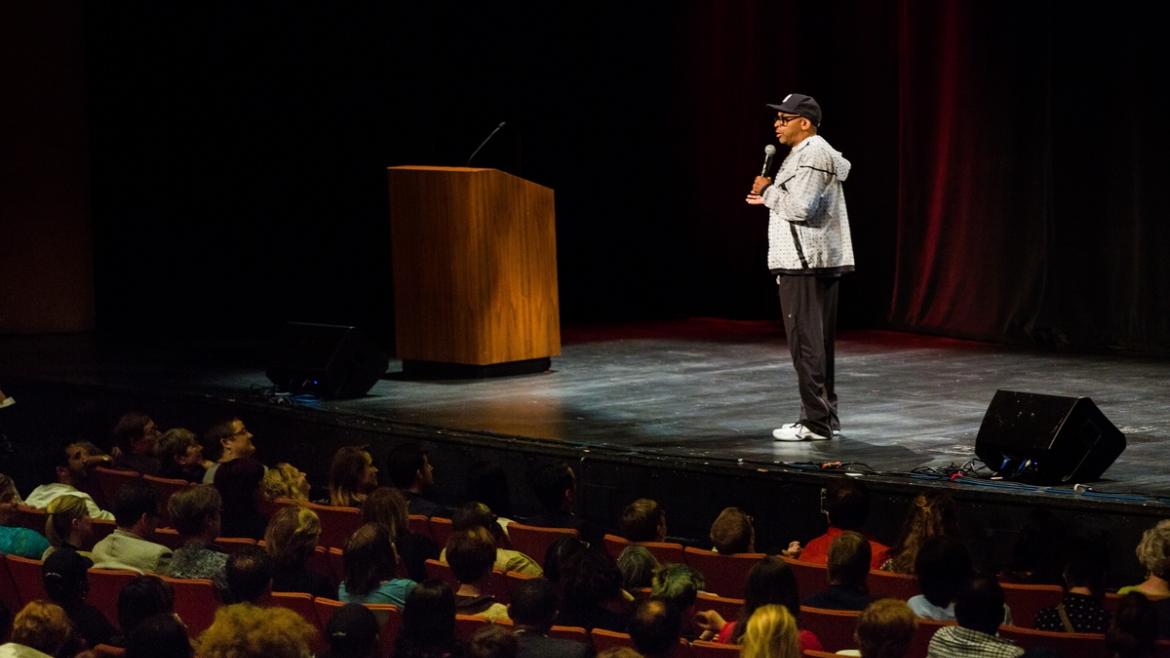Spike Lee, who has been hailed as a visionary filmmaker, the voice of a new generation and agent provocateur on many social issues, admitted to an Arizona State University audience that his point of view is firmly rooted in “old school” values of the 20th century.
“I’m from an era where your parents told you what to do,” Lee told a capacity crowd of 3,000 people at ASU Gammage Friday evening, many of them aspiring filmmakers and artists. “There was no discussion or debate. Whether I liked it or not, I said ‘yes.’ ”
That message seemed to resonate with the standing room only crowd who came to hear Lee discuss his views on education, politics and the film industry.
The Academy Award-nominated director known for “Do The Right Thing” and “Malcolm X” was invited by ASU’s Film SparkASU’s Film Spark is a unit of ASUs Herberger Institute for the Design and Arts., a film and media program based in Los Angeles that connects students to jobs in the entertainment industry.
Sporting a New York Yankees baseball cap, white and black polka dot jacket and black T-shirt and tennis shoes, politics and education were on the filmmakers' mind.
Lee, who praised ASU’s efforts to innovate in higher education, said he believes the state of learning has gone backward and that popular culture has glamorized the idea of “keeping it real” in favor of growing intellectualism.

Spike Lee speaks to the audience during an event at ASU Gammage on the Tempe campus Friday, March 4, 2016. The iconic director discussed his path into film and the industry itself. Photos by Deanna Dent/ASU Now
“We never, ever made fun of anybody who was smart. You got as much love for your intelligence, as much as athletes got for sports,” said Lee, who grew up in Brooklyn the son a jazz musician father and a mother who taught arts and literature. “It’s all turned around today … it’s no longer cool to have straight A’s or pursue academics. We have to turn this around.”
Lee said his life turned around when he discovered film — or as he stated — “it found him” in the summer of 1977. That’s when he returned to Brooklyn after his first year at Morehouse College, a private, all-male, historically black college in Atlanta, Georgia, where he was a “D+, C-minus” student through his first two years.
“It wasn’t because I wasn’t smart,” Lee said. “I just wasn’t motivated.”
He got motivated during the summer break before his junior year when he found a Super 8 camera on a friend’s bedroom floor and used it to film looters during a famous electricity blackout in July, 1977. Lee assembled the footage when he went back to Morehouse and with the help and guidance of a film instructor, put together his first film, “Last Hustle in Brooklyn.”
“I finally said, ‘This is what I want to do in life’ and I am doing what I love,” Lee said. “When you do a job you love, it’s not a job anymore. Hopefully you have not chosen a degree depending on how much money you can make. The worst existence you have is to go to a job you hate. For me, that’s not living, but living paycheck to paycheck.”
Lee told aspiring filmmakers that a life in cinema is not for the weak or faint of heart.
“This business is tough. It’s tough,” said the director whose latest film “Chi-Raq” was produced by Amazon Studios. “There is no such thing as an overnight success. Don’t believe it. Whatever you do, you have to learn your craft. You gotta work, work, work.”
Lee also spoke about the #OscarsSoWhite controversy that caused him to skip this year's Academy Awards ceremony. (He attended a New York Knicks game while dressed in a tuxedo — a message to the entertainment industry.)
“The Academy Awards have nothing to do with jobs, the battle is with the studios, the gatekeepers,” Lee said. “Until there’s more diversity in those areas, nothing will change … filming with diverse casts make more money but we’re not in the room where these discussions are made.”
More Arts, humanities and education
Illuminating legacy at ASU
In 2020, the ASU Art Museum unveiled a groundbreaking installation, "Point Cloud (ASU)," by renowned artist Leo Villareal. The art piece was given a permanent home on the Tempe campus in 2024 thanks…

Name change for ASU's Mary Lou Fulton Teachers College reflects college's mission
Arizona State University’s Mary Lou Fulton Teachers College has a new name: the Mary Lou Fulton College for Teaching and Learning Innovation.The name change, which will be completed in time for the…

Exhibit to feature artwork inspired by oral histories from Arizona's oldest botanical garden
Though it is Arizona's largest botanical garden and has been an established touchstone of the community for more than 100 years, many students in Arizona State University Professor Ellen…
